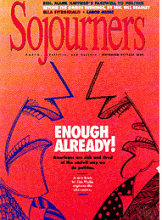Debate over the importance of "role models" and "mentoring" touches on everything from the behavior of professional athletes to the trumpet call to men sounded by Promise Keepers. Charles Barkley claims no responsibility to be a role model, while a Million Men march to proclaim they ought to be.
A steady stream of unsettling incidents involving young people helps propel the discussion on the impact of role models—positive and negative—on impressionable youth and formative children. It's an especially urgent topic in urban America, where the social and economic fabric continues to unravel. The plagues of racism, violence, poverty, and environmental degradation have some obvious linkages to the more muted crisis of the declining number of healthy, intact families.
The end results of disintegrating family structures are obvious in our troubled Buffalo, New York neighborhood. Adult models of responsibility, maturity, and employment are hard to find on the West Side. Of the 50 or so children and teens that attend our church's youth programs, only one family is headed by a married, employed couple. Pain and disruption mark nearly all of their homes. Missing father, alcoholic mother, poor food, siblings fathered by different men (all now absent), drugs, violence.
Read the Full Article
